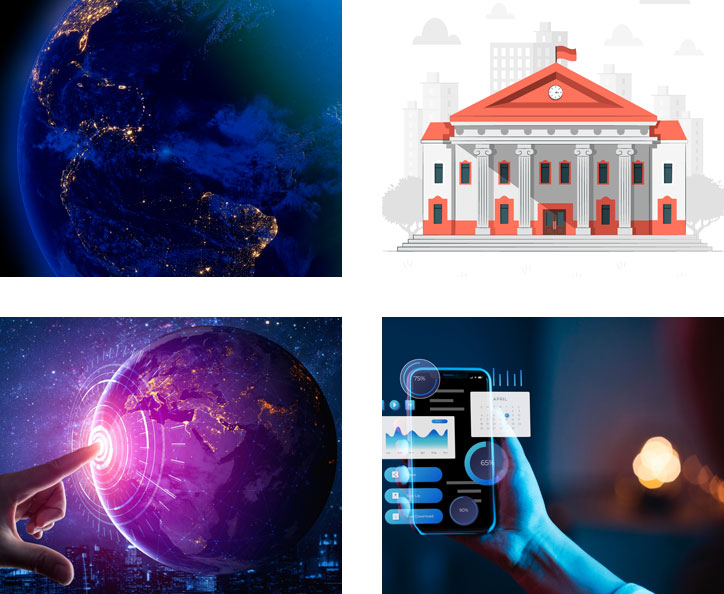US SUMMIT The National Geospatial Ecosystem of the United States
15 May 2024 | 1600-1900

Join us as we explore the national geospatial ecosystem in the United States. Universities, government, non-profit organizations, and the private sector are enabling cutting edge advancements in geospatial information and technology that are revolutionizing decision-making and societal benefits across the nation. These sessions will cover forward-thinking policies, groundbreaking research, collaborative initiatives, practical applications, and geospatial innovation that is changing the use of information in United States.

Government plays a crucial role in guiding the national geospatial ecosystem through forward looking strategies that encourage the innovative use of geospatial information and technologies. By establishing policies, regulations, and standards, they ensure responsible and effective data use. This includes addressing national priorities like climate resilience, national security, emergency management, census and survey data collection, and public health. Such efforts demonstrate the government's commitment to leveraging geospatial technologies for societal improvement.
Discussion Points:

Executive Director
Federal Geographic Data Committee, U.S. Geological Survey
USA
Josh serves as the Executive Director for the Federal Geographic Data Committee providing the leadership, coordination, and communication to promote the development, use, sharing, and dissemination of geospatial data nationwide. In this role he provides executive leadership for the coordination of U.S. federal geospatial activities in collaboration with the 32 FGDC member Federal Agencies and OMB to implement the Geospatial Data Act and conduct strategic planning and visioning for the implementation of National Spatial Data Infrastructure (NSDI) across Federal, State, Tribal and local government agencies, academic institutions, non-profit organizations and the private sector.

Chief Geography Division
U.S. Census Bureau
USA

Deputy Chief Strategy Officer
U.S. Veterans Health Administration
USA

Director, Foundation GEOINT
National Geospatial-Intelligence Agency
USA
Mr. Todd E. Johanesen serves as Director, Foundation GEOINT Group at the National Geospatial-Intelligence Agency (NGA), located in Springfield, Virginia, U.S.A. In this capacity, he leads an organization that provides assured, timely, relevant, and accurate foundation geospatial intelligence (GEOINT) data, products, and services in support of prioritized requirements of the warfighter, our national security objectives, and Safety of Navigation needs of the U.S. government. Mr. Johanesen earned a Bachelor of Arts degree in Geography from California State University, Long Beach, in 1989. In 2001, he received a Master of Science degree from Purdue University, West Lafayette, Indiana, where he studied Geomatics engineering. He is also a 2010 Director of National Intelligence Science and Technology Fellow.

Geographer, U.S. Bureau of Transportation Statistics
National Spatial Data Infrastructure, Transportation Theme Lead
USA
Through pioneering research and education, academia is shaping the future of geospatial science and technology. By fostering partnerships and training experts, solutions to major issues such as sustainability and health are being implemented. Geospatial science is transforming the landscape, and academia is at the forefront.
Discussion Points:

Director, Center for Geospatial Analytics, Associate Professor
Graduate School of Geography
Clark University
USA
Hamed Alemohammad is an Associate Professor in the Graduate School of Geography and Director of Clark Center for Geospatial Analytics at Clark University. He is an interdisciplinary scientist with expertise in remote sensing, earth science, and artificial intelligence (AI). Hamed has been the PI for several projects focused on developing novel AI models for multispectral, microwave and synthetic aperture radar (SAR) satellite observations. Prior to Clark University, Hamed was the Chief Data Scientist and Executive Director at Radiant Earth Foundation where he established and led the development of Radiant MLHub - the open-access repository for geospatial training data and AI models. He received his Ph.D. in Civil and Environmental Engineering from MIT.

USC Professor and Founding Director
Spatial Sciences Institute, University of Southern California
USA

U-Spatial Associate Director
University of Minnesota
USA

Director, Spatial Analysis
IPUMS, University of Minnesota
USA

GIS Librarian Computational Methods and Data, Yale University Library
Yale University
USA
With over two decades of geospatial expertise, Miriam Olivares, GISP leads the GIS support services at Yale University, instructing and advising on geospatial applications to promote cutting-edge teaching and research. Her interdisciplinary collaborations, scholarly, and consulting work touch upon geospatial data management, GIScience, supply chain, natural hazards, and marine conservation. Olivares geospatial service includes membership in the Leventhal Map & Education Center's Board of Review at the Boston Public Library, at the Advisory Board of the Academic Network of the United Nations initiative on Global Geospatial Information Management (UN-GGIM): Americas, and Connecticut GIO's GIS Strategic Plan and GIS Clearinghouse Workgroups. She co-founded and co-chairs GIS LATAM and served as a director on the University Consortium for Geographic Information Science board.
Non-profit organizations are leading geospatial innovation, advocating for open access to geospatial data and promoting data transparency and accountability to ensure geospatial data is freely available and used responsibly. Additionally, non-profits implement geospatial projects that address pressing social, environmental, and humanitarian challenges, leveraging the power of geospatial technologies for positive change.
Discussion Points:
The private sector is a driving force behind geospatial innovation, consistently pushing the limits of what's achievable through research and development. By investing in state-of-the-art technologies, the private sector pioneers new solutions and products, revolutionizing industries and enhancing lives. The private sector actively collaborates with government, academia, and non-profit organizations to tackle specific challenges or opportunities using geospatial solutions, fostering a culture of innovation and collaboration that expedites the development and adoption of geospatial technologies.
Discussion Points:

Executive Director
Taylor Geospatial Institute (TGI)
USA

SVP of Business Attraction
Greater St. Louis, Inc.
USA
Tracy Whelpley is Senior Vice President of Business Attraction at Greater St. Louis, Inc. -an alliance of business and civic leaders working together to create jobs, expand inclusive economic growth, and improve the St. Louis region's global competitiveness. Tracy is responsible for implementing highly targeted marketing initiatives that compel corporate executives and entrepreneurs to explore the advantages of investing and locating within the St. Louis metro.
Tracy is also a champion for the region's GeoFutures Strategic Roadmap, a 10-year action plan that channels the collective action of leaders across public, private, academic, and government spheres to establish St. Louis as a premier destination for geospatial innovators to collaboratively unlock industry opportunities and forge solutions to the world's most pressing challenges.
Before joining Greater St. Louis, Inc., Tracy held various agency roles, leading brand marketing communication teams to drive awareness and revenue objectives for multinational corporate clients, including Bayer Crop Science and Enterprise Mobility.
Ms. Whelpley earned her Bachelor of Journalism from the University of Missouri-Columbia and her Master of Business Administration from the University of Missouri-Kansas City.

SVP
Dewberry
USA
As Senior Vice President, Amar Nayegandhi, CP, CMS, GISP leads the Geospatial and Technology Services group at Dewberry and provides program oversight for the execution of all remote sensing projects nationwide. An expert in topographic and topobathymetric lidar data acquisition and processing, Amar was the Director of the American Society for Photogrammetry and Remote Sensing (ASPRS) Lidar Division and was appointed as an ASPRS Fellow in 2024. He co-edited the ASPRS DEM User's Manual, 3rd Edition, and authored the chapters on Airborne Topographic Lidar and Airborne Lidar Bathymetry. Amar co-authored the USACE EM 1110-1-1000 Manual on Photogrammetric and Lidar Mapping.
Amar has presented his research and technological findings at 100+ international conferences and technical workshops, including an invitation from the USGS to present the industry perspective for the USGS 3D Elevation Program at the United Nations World Geospatial Information Congress (UNWGIC) in Deqing, China. Amar has authored 16 manuscripts in various international journals and 65+ data series and reports for the USGS. He has a Bachelor's in Electrical Engineering from the University of Mumbai and a Master's in Computer Science from the University of South Florida. He is an ASPRS Certified Photogrammetrist and Certified Mapping Scientist, and a GIS Professional.

COO
Rendered.ai
USA

Director - National Mapping Solutions
Esri
USA
Mark has worked in GIS and mapping since 1984. As Esri's Director of National Mapping Solutions, since 2005, he has a passion for working with National Mapping, Maritime, Aviation and Geospatial Authorities to help them be successful. Mark previously worked with these same organizations for nearly 10 years as a Senior Consultant and Project Manager in Esri's Professional Services. Prior to Esri, Mark was on the management team at NAVTEQ (now HERE), as they were pioneering digital mapping for in-vehicle navigation, web and mobile uses. Mark participates on the United Nations Committee of Experts on Global Geospatial Information Management (UN-GGIM).

Director of Product Strategy
Teren, Inc.
USA

Head of Global Strategy & Growth
SkyFi
USA